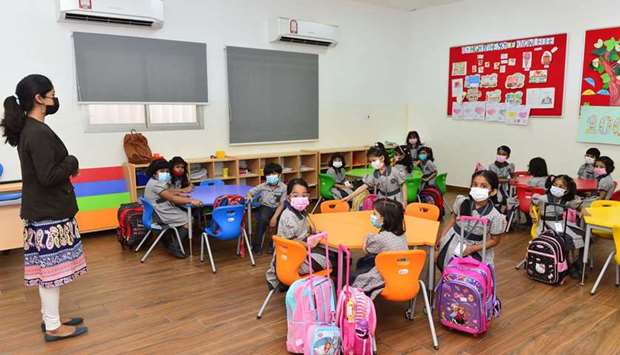Prayers were held at mosques without social distancing while schools implemented the 100% in-person attendance rule as Phase 4 of the gradual lifting of Covid-19 restrictions began in Qatar on Sunday.
The other highlights of this phase, as announced by the Cabinet recently, include the relaxing of masks rules and allowing people to not wear masks in open public areas with some exceptions, allowing 100% attendance in workplaces, permitting children in mosques, and several others.
Long traffic queues were witnessed on some roads leading to schools, as classes resumed at full strength for the first time since March 2020 when the Covid-19 curbs were first imposed. Since then, Qatar has followed a policy of blended learning involving both online and in-person classes, or complete virtual learning as a measure to curb the spread of the virus.
The Ministry of Education and Higher Education (MoEHE) recently announced the easing of some precautionary measures and restrictions in line with the plan to gradually lift restrictions imposed as a result of combating the spread of Covid-19. These measures include attendance regulations in governmental and private kindergartens, schools and higher education institutions.
Accordingly, kindergartens, schools and higher education institutions returned to study with the full attendance of students on their premises. Schools and other educational institutions had made the necessary arrangements to ensure the well-being and safety of all concerned, including students, teachers and other staff members.
The MoEHE had stressed the need to adhere to social distancing between students, which is a minimum of 1m at all times, observing physical distancing in employee rooms and offices, ensuring a safe distance between the employees and colleagues, and requiring all students and administrative and teaching bodies to wear a mask while in schools and higher education institutions.
The ministry also affirmed the need to continue applying the bubble system in study and transportation and allowing the use of buses to transport students with a capacity of 75%, while continuing to apply the attendance and absence policy, and adhering to precautionary measures to prevent infection such as washing hands and sanitising them regularly and disinfecting surfaces with sterilisers.
Meanwhile, mosques around Qatar saw the daily prayers being held without social distancing but with the observance of other precautionary measures. Children are also allowed to enter now. In line with a recent Ministry of Endowments and Islamic Affairs (Awqaf) announcement, toilets and ablution areas were also opened in non-crowded areas.
The Cabinet has also permitted 100% attendance in both public and private workplaces in this phase, while also allowing people to not wear masks in open public areas except in the following cases: in organised public activities at markets, exhibitions and during events; and on the premises of mosques, schools, universities and hospitals. Also, all citizens and residents must continue to wear masks in closed public places.
The Doha Metro and public transport services are now operating at 75% of their capacity, while restaurants and cafes have been allowed to function at an enhanced capacity. Several other relaxations also came into effect on Sunday.
Long traffic queues were witnessed on some roads leading to schools, as classes resumed at full strength for the first time since March 2020 when the Covid-19 curbs were first imposed. Since then, Qatar has followed a policy of blended learning involving both online and in-person classes, or complete virtual learning as a measure to curb the spread of the virus.
The Ministry of Education and Higher Education (MoEHE) recently announced the easing of some precautionary measures and restrictions in line with the plan to gradually lift restrictions imposed as a result of combating the spread of Covid-19. These measures include attendance regulations in governmental and private kindergartens, schools and higher education institutions.
Accordingly, kindergartens, schools and higher education institutions returned to study with the full attendance of students on their premises. Schools and other educational institutions had made the necessary arrangements to ensure the well-being and safety of all concerned, including students, teachers and other staff members.
The MoEHE had stressed the need to adhere to social distancing between students, which is a minimum of 1m at all times, observing physical distancing in employee rooms and offices, ensuring a safe distance between the employees and colleagues, and requiring all students and administrative and teaching bodies to wear a mask while in schools and higher education institutions.
The ministry also affirmed the need to continue applying the bubble system in study and transportation and allowing the use of buses to transport students with a capacity of 75%, while continuing to apply the attendance and absence policy, and adhering to precautionary measures to prevent infection such as washing hands and sanitising them regularly and disinfecting surfaces with sterilisers.
Meanwhile, mosques around Qatar saw the daily prayers being held without social distancing but with the observance of other precautionary measures. Children are also allowed to enter now. In line with a recent Ministry of Endowments and Islamic Affairs (Awqaf) announcement, toilets and ablution areas were also opened in non-crowded areas.
The Cabinet has also permitted 100% attendance in both public and private workplaces in this phase, while also allowing people to not wear masks in open public areas except in the following cases: in organised public activities at markets, exhibitions and during events; and on the premises of mosques, schools, universities and hospitals. Also, all citizens and residents must continue to wear masks in closed public places.
The Doha Metro and public transport services are now operating at 75% of their capacity, while restaurants and cafes have been allowed to function at an enhanced capacity. Several other relaxations also came into effect on Sunday.

